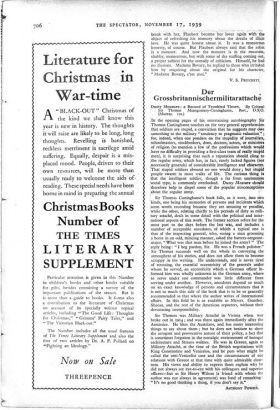Der Grossbritannischermilitarattache
Dusty Measure : a Record of Troubled Times. By Colonel Sir Thomas Montgomery-Cuninghame, Bart., D.S.O. (Murray. 125.)
IN the opening pages of his entertaining autobiography Sir Thomas Cuninghame touches on the very general apprehension that soldiers are stupid, a conviction that he suggests may owe something to the military " tendency to pragmatic valuation" ; for, indeed, when one ponders on the stupidity of journalists, schoolmasters, stockbrokers, dons, doctors, actors, or ministers of religion (to mention a few of the professions which would have no difficulty in providing a first-class team of really stupid men), it is surprising that such a reputation should cling to the regular army, which has, in fact, rarely lacked figures (not necessarily generals) of considerable intelligence and character. That stupid soldiers abound no one would deny ; but stupid people swarm in most walks of life. The curious thing is that the intelligent soldier, though a far from uncommon social type, is commonly overlooked. Dusty Measure should therefore help to dispel some of the popular misconceptiOns abdut the regular army.
Sir Thomas Cuninghame's book falls, as it were, into two 'kinds, one being his memories of persons and incidents which seem worth recording because they are amusing or peculiar, while the other, relating chiefly to his periOds of duty as mili- tary attaché, deals in some detail with the political and inter- national aspects of this work. The former section refers for the most part to the days before the last war, and includes a number of acceptable anecdotes, of which a typical one is that of the inspecting general, who, seeing a man grooming a horse in an odd, mincing manner, asked the battery-sergeant- major, " What was that man before he joined the army? " The reply being: " I beg pardon, Sir. He was a French polisher." Sir Thomas succeeds well on the whole in conveying the atmosphere of his stories, and does not allow them to become scrappy in the writing. He understands, and is never tired of stressing, the essential eccentricity of the generals under whom he served, an eccentricity which a German officer in- formed him was wholly unknown in the German army, where to serve under one commander was little different from serving under another. However, anecdote's depend so much on an exact knowledge of persons and circumstances that it is not so much this side of the book that is to be so generally recommended as that where the author writes of international affairs. In this field he is as readable as Messrs. Gunther, Sheean, and the rest of the American reporters, without their devastating irresponsibility.
Sir Thomas was Military Attaché in Vienna when war broke out in 1914 ; and was there again immediately after the Armistice. He likes the Austrians, and has many interesting things to say about them ; but he does not hesitate to show the arrogant and provocative nature of their policy, a fact that is sometimes forgotten in the nostalgic environment of baroque architecture and Strauss waltzes. He was in Greece, again as Military Attaché, at the time of the British negotiations with King Constantine and Venizelos, and he puts what might be called the anti-Venizelist case and the circumstances of our relations with Greece at that time with quite admirable clear- ness. His views and ability to express them explain why he did not always see eye-to-eye with his colleagues and superior officers—but as Sir Henry Wilson (a friend with whom the author was not always in agreement) was fond of remarking: " It's no good thinking a thing, if you don't say it."
&allow POWELL.




































































 Previous page
Previous page